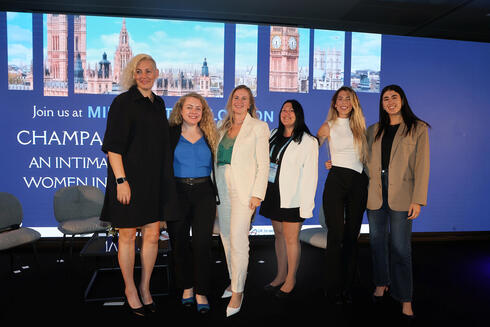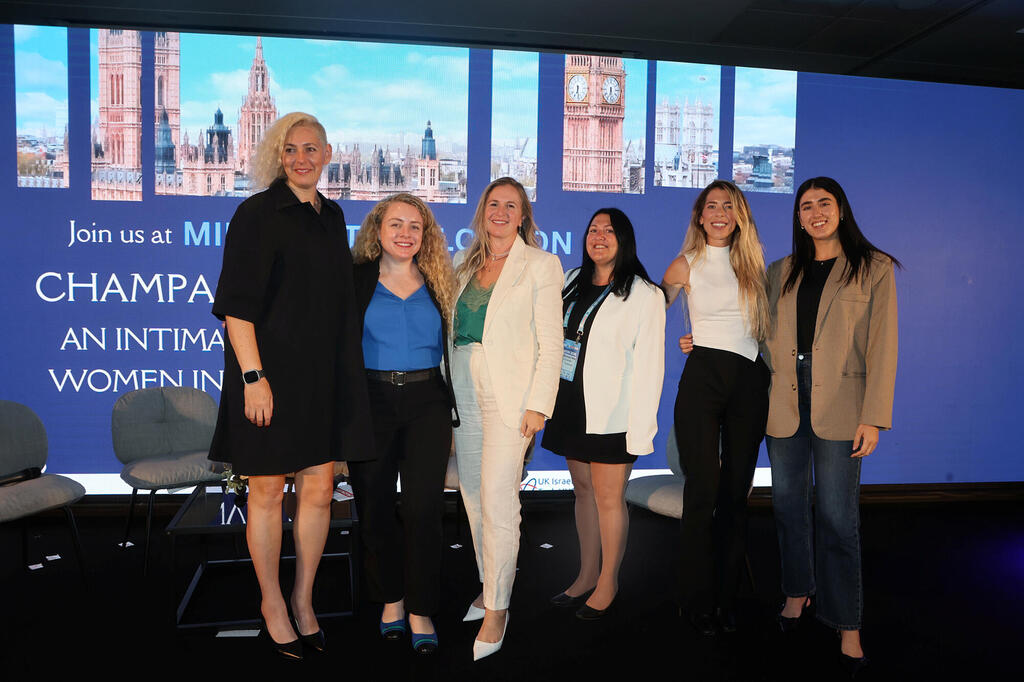
Mind the Tech London 2024
"Instead of playing games, my father taught me to guess what the stock prices will be"
Female entrepreneurs and senior investors spoke at a special event of the "Yazamiyot" organization in collaboration with the UK-Israel Tech Hub at the British Embassy in Israel about their path in the world of technology and the difficulties faced by women in the industry.
"Instead of playing games like 'spot the red car,' my father taught me on the way to school to guess what the stock prices will be," said Emma Sinclair, who at the age of 29 became the youngest CEO to issue a company on the London Stock Exchange, speaking at Calcalist and Leumi’s Mind the Tech London conference.
Sinclair was the keynote speaker at a special event of the "Yazamiyot" organization in collaboration with the UK-Israel Tech Hub at the British Embassy in Israel held as part of the conference and focused on female entrepreneurship, in which female entrepreneurs, investors and senior managers from the Israeli and British high-tech industry participated. The event revealed surprising stories about the road to success of the women who participated in it.
1 View gallery


A special event of the "Yazamiyot" organization in collaboration with the UK-Israel Tech Hub at the British Embassy in Israel was held as part of the conference.
(Photo: Yariv Katz)
"From the age of four to 18, I read the stock page of the Financial Times on the way to school. My father convinced me that it was like reading fun gossip," said Sinclair, CEO of the software company EnterpriseAlumni, which developed a platform that allows companies and organizations to keep in touch with their alumni to benefit and recruit some of the former employees again.
"At university I was a terrible student and I didn't make it to lectures," continued Sinclair, who told how during her studies she interned in an investment fund, and used to order pizza with friends. Later, she managed to amaze her employers, when she put together a detailed financial report on the pizzeria chain. According to her, the experience she gained eventually led her to the IPO of her company.
Hilla Ovil Brenner, a partner in Arieli Capital and the founder of the "Yazamiyot" organization, which seeks to encourage female leadership in the local high-tech scene, opened the event: "What we learned is that for women entrepreneurs, as the research shows, role models are very important." Ovil Brenner emphasized the importance of the event in presenting examples of successful women in the industry.
Yazamiyot was founded in 2010 by Ovil Brenner and currently has about 8,000 female technological entrepreneurs. The organization collaborates with international companies to promote and achieve maximum exposure of female technological entrepreneurship through the establishment of accelerators, mentoring and competitions.
Calcalist CEO Noa Tamir added a personal perspective to the unique challenges faced by women in the industry: "For women it is more challenging to have a successful career and on the other hand to be involved in the home and in raising the children. Men don't feel it the same way."
Tamir shared a personal anecdote from the morning of the event, when she received a message from her daughter's teacher, which a man might not have received, demonstrating the complexity of managing a career and a family.
In the main panel, which included several leading women in the industry, interesting insights emerged about the unique challenges for women in high-tech. Ella Goldner, founder of Zinc VC, shared a personal story: "When I was raising capital and I was pregnant, I asked my mother, who was an entrepreneur in Israel and paved the way for me, if they notice I’m pregnant. She answered, 'Who cares?', but I felt that I didn't want the institutional investors to know. It's still a sensitive issue in the industry."
Goldner emphasized the importance of diversity in making investment decisions: "If you don't have 30% of women around the decision-making table - then the decisions will not be made in favor of women." She called for systemic change in the venture capital industry.
Shlomit Steinberg-Koch, founder and CEO of Predicta Med, who won the promising entrepreneur competition for 2024 in a competition held before the conference, spoke about facing similar challenges: "Before I started Predicta Med, I was about to get a senior position in an interesting startup. Just before signing the contract, the CEO asked me - 'Shlomit, you don't intend to have children soon, do you?' I smiled and said 'no', but then I told my husband that I could not work with this CEO. It made me realize that there is a gap between how we are perceived by some men. Having children is our superpower, not a disadvantage."
In a personal conversation with Tagil Yaniv, manager of strategic partnerships and growing technologies at the UK-Israel Tech Hub at the British Embassy in Israel, Steinberg-Koch was asked what made her open her first business, and shared an emotional personal story: "When I worked at Mazor Robotics I had a good friend named Nadav , the son of Prof. Moshe Shoham, the founder of Mazor Robotics, unfortunately, he died in Nepal 10 years ago. It was very traumatic for me."
"A few years later, when I started working on a small project, I suddenly saw that there was a need to focus on autoimmune diseases," she continued. "When I told Moshe Shoham (who was the first investor in the company) about it he really gave me the inspiration to do it and start my startup."
Steinberg-Koch also emphasized the importance of developing a support network by women entrepreneurs: "Make sure you have a supportive network. Building a startup is very difficult. Make sure you have partners and mentors to support you. The support I received helped me to have the courage to do what I do."
Kirsty Rutter, Director of Strategic Investments at Lloyds Banking Group, added a surprising insight: "90% of the pitches I see are from male-dominated teams. I always offer help with board diversity, but often don't hear back from them. It shows how much work remains to be done in the field."
Rutter shared her insight - that women should use their unique strength, and not try to be someone else: "I learned to use my voice in pitches." In addition, she said that she "always tries to give feedback, and when women ask me for help, I always agree."
Amy French, director of Level39, presented a disturbing statistic: "Less than 10% of the founders in our startup community are women. We're trying to encourage more women to join, but it's a slow process." She emphasized the importance of creating a supportive and encouraging environment for women entrepreneurs.
Michelle Taycher Nishry, senior investment manager at Qualcomm Ventures, shared her personal experience: "Over the past 18 months, I have met relatively few women in the deep tech industry, which is one of my areas of interest." She called for the encouragement of women to enter technological fields that are considered relatively advanced.
After the panel, several promising start-ups of Israeli women entrepreneurs were presented, including as mentioned Steinberg-Koch's start-up, Predicta Med, which develops a platform for the early detection of autoimmune diseases. "We are able to shorten the detection procedure of the disease by one to four years," she said. "It could change the lives of millions of people."
Dr. Dana Rabinovich, founder of OphtiMedRx, presented an innovative treatment for retinal degeneration disease. "The potential of the market is $25 billion by 2028, with 140 million patients in 2024."
Esti Brantz, the founder of ANINA, presented the startup's creative solution to the problem of food waste, which results from the fact that a huge amount of vegetables and fruits are thrown in the garbage - just because they are not aesthetically pleasing. "We combined innovative technology, design expertise and culinary knowledge to create a new eating experience in a capsule," explained Brantz. "Our capsules become a meal full of flavor and nutritional value. Each capsule contains about half of the recommended daily intake of vegetables, dietary fiber and protein."
Keren Shurkin, director of the UK-Israel Tech Hub at the British Embassy in Israel, emphasized the importance of technological cooperation between the countries: "We believe in the power of technological ties as a key tool in strengthening diplomatic relations between Britain and Israel."
Shurkin added: "We place special emphasis on empowering women entrepreneurs, understanding that they play an important role in promoting innovation and economic growth. By encouraging diverse leadership and cooperation, we guarantee that our partnership will continue to develop and shape the technological future of both countries."
The event ended with a call by Michal Freeman-Shor, director of operations of the London Stock Exchange in Israel: "When you come to raise money, be excellent. No one gives money for nothing." She emphasized the importance of readiness and professionalism in the capital raising process.
Ovil Brenner summed up the event: "We still have a lot of work to do." She emphasized the need to continue promoting women in the high-tech industry and the importance of similar events in creating support networks and role models for women.













